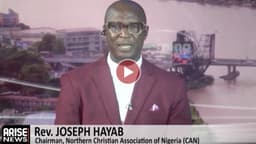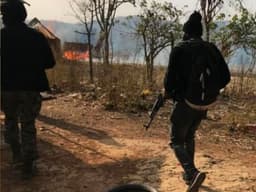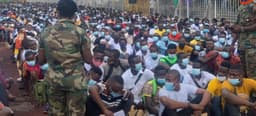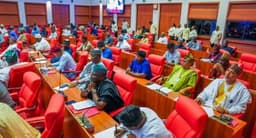
School destroyed by bandits in Kagara, Niger State
At least 188 public schools have been shut down due to insecurity in Northern Nigeria.
A search carried out by our reporters showed that many schools in the region had been shut due to attacks on the villages by bandits just as some of them are now serving as camps for people displaced by insecurity. Our correspondents mentioned at least 39 in Zamfara; 30 in Niger; six each in Sokoto and Kaduna in addition to the reported 52 and 55 schools in Katsina and Benue states respectively which have been shut. This figure may be higher than this as some areas cannot be accessed to get the true picture of things.
The investigation did not also include Borno, Yobe and Adamawa states that have peculiar challenges occasioned by Boko Haram attacks in the last 15 years.
In some cases, schools had been opened at IDPs camps, thereby giving some children the opportunity to learn. Also, many displaced communities have been rebuilt, a development that led to the relocation of the IDPs to their ancestral homes alongside their children.
However, sources said still there are hard -to-reach communities in the affected states.
Situation in North West
Of the 39 identified schools in Zamfara, 20 are primary schools, while 19 are secondary schools.
In Niger, 18 primary schools, one secondary school, and 11 nomadic designated schools are shut.
Three secondary schools, two technical colleges and one primary school have been shut in Sokoto State.
This is happening despite a report showing that some of the states have highest number of out-of-school children in Nigeria.
The ICIR reports that Nigeria has one of the highest numbers of out-of-school children in the world, with estimates ranging between 10 and 20 million, according to 2024 UNICEF report.
Specifically, the country’s education system faces an alarming crisis, with 10.2 million children of primary school age, and another 8.1 million of junior secondary school age out of school.
According to data from the National Mass Education Programme Initiative (NMPI), the number of out-of-school children stands at 1.4 million in Katsina, representing 45.9 per cent of its school aged population.
Kebbi State has 67.6 per cent of its school-age population out of school, recording over 1.06 million children outside the classroom.
Sokoto has 1.25 million out of school children. This means Katsina, Sokoto, and Kebbi lead the ranking of out of school children in Nigeria.
Zamfara, Kaduna, and Niger sit in the top 15 of the ranking.
According to Statista, Katsina had 3,375 primary schools in the 2018/2019 school year.
Many public schools across Sokoto, Zamfara, Katsina, Niger, Kaduna, Kebbi, Benue and Kwara states have remained closed for years, others for months or weeks after they were shut down owing to attacks by Boko Haram, ISWAP, Ansaru, Lakurawa, Mahmuda terrorists and bandits.
Findings revealed that the closures have forced thousands of children out of school, with some classrooms turned into shelters for displaced persons and camps for security operatives.
While some students have been relocated to urban centres and merged into existing schools, others have dropped out.
This is just as educationists warn that prolonged closure of rural schools will deepen illiteracy and poverty.
6 identified schools shut in Sokoto
In Sokoto State, key boarding schools, including the Federal Government Technical College, Wurno; Government Girls’ Secondary School, Rabah; Government Girls’ Science Secondary School, Illela; Olusegun Obasanjo Technical College, Bafarawa (Isa LGA); and Adamu Mu’azu Science Secondary School, Goronyo remain shut years after closure by the administration of former Governor Aminu Tambuwal.
In Sabon Birni LGA, displaced villagers now occupy school buildings by night and vacate them during the day for classes. In Manawa community, Isa LGA, the only primary school has been taken over by bandits who use it as a resting point, Daily Trust gathered.
“This is a serious blow to the future of our children. The government must take decisive and urgent action to restore security and return children to school,” said a former Sole Administrator of Goronyo LGA, Alhaji Zakari Shinaka.
“There are many schools in Sabon Birni that have stopped functioning because entire communities have been displaced by bandits,” a local resident, who requested anonymity, told Daily Trust.
He added: “The displaced now live in the LGA headquarters, occupying school buildings at night. They vacate the premises in the morning so that classes can resume, only returning at dusk.”
The state’s Commissioner for Basic and Secondary Education, Professor Ahmad Ladan Ala, was unreachable; while other government officials declined to comment.
Zamfara: 20 primary schools, 19 secondary schools abandoned
In Zamfara State, many schools have remained shut for over six years in bandits-prone LGAs such as Anka, Tsafe, and Kaura Namoda. Only a handful in Anka town remains functional under military protection.
The affected schools include: Kawaye Primary School, Dawangiye Primary School, Tubuki Primary School, Tungar Ku-da-ku Primary School, Duza Primary School, Tungar Mata Primary School, Tamani Primary School, Makakari Primary School, and Sunke Primary School.
Others are: Sabon Birni GDSS, Sabon Birni Primary School, Jar Kuka Primary School, Abare Primary School, Duhuwa Primary School, Mayanchi Primary School, Fangaltama Primary School, and Dareta Primary School.
A resident of Anka town, Malam Hassan Isa, said: “Many of our children have stopped going to school in this area for the past seven years. Only a few of them were transferred to other schools in the relatively peaceful towns. We are in a serious situation.”
In Tsafe, schools like GSS Danjibga, GSS Yankuzo, Makera Primary School, GSS Wanzamai and Sugawa Primary School are now occupied by troops.
Ali Yusuf Mai Goro, a resident of Tsafe, told Daily Trust that some of the affected schools were turned into accommodation for security operatives, including soldiers and mobile policemen.
“Danjibga, Yankuzo, and Wamzamai secondary schools have been taken over by soldiers. But Makera and Sungawa were left empty for this long. Our children, especially the primary school pupils, have stopped going to school, while only a few secondary school students were able to continue with their studies in other places,” he said.
A resident of the Dan Isa town, Muhammad Shehu Mai Taya, said the two primary schools and 12 secondary schools in the district have been closed since 2023.
He said children in the area had abandoned schools due to banditry. “In the whole of Dan Isa District, no single primary or secondary school is functioning at present. Our main concern is not school but peace because without it, we cannot do anything. Peace first before anything else. So, our children have stopped going to school for their safety,” he said.
Dozens of schools closed in Katsina
Katsina State has also recorded closures. A 2024 study by Oxford Policy Management, supported by UNICEF, revealed that 52 schools were shut in Batsari, Faskari, and Kankara LGAs, with only nine reopened. Between 2020 and 2025, at least 330 students were abducted, 14 teachers kidnapped, and five killed in these LGAs.
The most infamous case was the 2020 Kankara abduction where over 200 pupils were kidnapped.
Daily Trust had reported a school at Marabar Dan Ali in Danmusa Local Government Area which was converted to a military camp, forcing pupils to either relocate to a neighbouring village school and study inside an unroofed, uncompleted mud house or abandon their studies completely.
Governor Dikko Radda recently admitted that insecurity has crippled schools, markets, and farmlands in at least eight LGAs including Jibia, Danmusa, Safana, and Sabuwa.
Speaking at the launch of an 18-month European Union–funded programme on Conflict Prevention, Crisis Response, and Resilience, the governor had said his administration was pursuing dialogue and negotiation to curb insecurity. He noted that community-led peace agreements had yielded results in Jibia, Batsari, Danmusa, and Kurfi LGAs, while discussions were ongoing in Kankara and Safana.
18 pry, 1 sec, 11 nomadic designated school deserted in Niger
In Niger State, schools like the Government Science College, Kagara—where 27 students and staff were abducted in 2021—have been shut and converted to military camps.
Other affected schools are Teacher’s Professional Development Institute, Dandaudu, Munya LGA and Mamman Kontagora Technical College, Pandogari in Rafi LGA.
Across Rafi, Shiroro, and Mariga LGAs, over 20 schools are deserted, including Central Primary School, Allawa; Gurmana Primary School; and Kwaki Primary School. In Allawa, three schools have remained empty since 2024 when soldiers withdrew.
Teachers say children sometimes spend three to five weeks at home whenever bandits are sighted in surrounding areas.
Governor Mohammed Umaru Bago has promised to relocate vulnerable schools into “mega schools” in Minna and other safer zones, but the plan is yet to take off.
Residents said 11 nomadic designated schools in Rafi LGA had been forced to shut down by bandits, while most of the pupils had dropped out.
In Shiroro LGA, Central Primary School, Allawa; Government Secondary School, Allawa; Model Primary School, Allawa; Gyaramiya Primary School; UBE Primary School, Samunaka; Gurmana Primary School; UBE Primary School, Plalali; Bassa Primary School; Kwaki Primary School; Chukuba Primary School and UBE Primary School, Rumace, have been abandoned.
In Mariga LGA, the schools forced to shut down due to insecurity include Central Primary, Ragada; L.E.A Primary School, Kadago-Gari; L. E. A Primary School, Faransi; Central Primary School, Mazame-Gari and L.E.A Primary School, Masawaci, among others.
“All these schools have been shut for a long time due to the fear of bandits. Among the listed schools, only Central Primary, Ragada, and the other primary schools in Ukari have been reopened, and even in the two schools, learning has not been stable because each time there’s movement of bandits around our area, they can spend three to five weeks without attending classrooms,” one of the teachers told Daily Trust on telephone.
When contacted, Director, Test and Measurement, Niger State Ministry of Education, Asab Abdullahi, said he needed a directive from the permanent secretary to speak on the issue.
Kaduna: Villages deserted, schools abandoned
In Kajuru LGA, villages such as Karimai and Cibiya are deserted, leaving at least six schools empty. In Chikun and Birnin Gwari LGAs, pupils from abandoned schools have been relocated to towns like Udawa, with some squeezed into overcrowded classrooms.
A youth leader, Yuhana Kufana, said there are villages like Karimai and Cibiya in Maro district of Kajuru where schooling has stopped because the residents of those communities have all fled due to insecurity.
He said, “Yet, all the schools there are government-owned. About six schools in that district are not functioning because the parents and families who once lived in those areas have all been displaced. Most of the residents have relocated to Mararaban Kajuru town and Kufana town to settle. In the Kujeni area, too, their school is empty because the residents have fled. This means that wherever the parents relocate to, their children cannot continue schooling.
“However, up to now, we do not know what is happening with the teachers who were assigned to those abandoned schools. Whether the education authorities have transferred them to other schools, we do not know. It is important to note that the state government has not officially declared the closure of those schools because of insecurity.
“But since there are no students left in the communities, the schools have been deserted by default. The government did not say it shut them down, but the reality is that with no residents left in the villages, the schools are no longer functioning. This is the situation we are facing at the moment.”
A community Leader in Udawa Town under Chikun LGA, Imam Muhammadu Udawa, said there are LEA schools in Labi, Anguwar Yako, Manini, Gwarso, Mil Biyu, Hayin Mato—all villages located under Birnin Gwari LGA—whose residents have now relocated to Udawa Town with their children to continue their education.
According to him, most of the villages have been deserted years back due to insecurity, and since then, the schools located in those communities remained empty. He said most of the students were scattered across other communities.
The Kaduna State Commissioner for Information, Ahmed Maiyaki, neither answered phone calls nor replied to text and WhatsApp messages sent to his mobile line by Daily Trust for comment.
Kebbi: Fear after Birnin Yauri abduction
In Kebbi South, particularly Danko Wasagu, schools remain closed after the abduction of 96 students from Federal Government Girls College, Birnin Yauri, in 2021.
Parents now prefer enrolling children in schools closer to towns. “We had to stop them from school for eight months. It’s safer than letting them fall into the hands of bandits,” said Yahaya Abdullahi, a father of three near Rijau.
Kabiru Diri, a farmer in the Kanya community area of the state, also said many of their children had been denied access to their schools.
He said, “Some of them were recently relocated to schools in more secure areas of Mahuta and other communities in Zuru Emirate. Some parents had even moved their children to schools in Birnin Kebbi, the state capital.”
55 schools closed in Benue in 2024, turned into IDP shelters
In Benue, schooling has collapsed in 11 LGAs including Guma, Logo, Agatu, Kwande, and Gwer West. Many classrooms now host displaced families.
At RCM Primary School, Agagbe, pupils share space with IDPs, while in Logo LGA, children sit idle as classrooms remain shut.
Amnesty International reported that 55 schools were destroyed or closed in Benue in 2024 alone, alongside the killing of at least 540 people within two months.
Our correspondent reports that learning has been interrupted across many of the 23 local government areas affected by recurring invasions.
The hardest-hit LGAs include Guma, Logo, Agatu, Kwande, Gwer West, Apa, Gwer East, Ukum, Katsina-Ala, Otukpo, and Makurdi where most schools have either been closed or taken over by displaced families.
At NKST Primary School, Anyiin in Logo LGA, education has been suspended after displaced villagers occupied the classrooms, while in Gwer West and Guma, most council wards no longer have functioning schools as residents have fled and armed groups have taken over their communities.
For instance, the RCM Primary School in Agagbe remains the only surviving school in Mbaakpa district of Gwer West even as it now struggles to operate with IDPs occupying half of its facilities.
A nine-year-old Ukeryima Emmanuella, who fled Tse Adekule village in Mbachohon ward with her parents, said: “The government should find a place for IDPs to stay so our school can run properly.”
Similarly, 12-year-old Orhena Terkuma, displaced from Tse Kpar in Sengev ward, said he wished to continue his education but could not as his school at Mbahungwa had been closed for a long time.
While the state’s Ministry of Education has yet to comment, the State Emergency Management Agency said it was working with the International Organisation for Migration (IOM), the European Union (EU) and other partners to find durable solutions.
Radio lessons for Kwara students
Though less affected, Kwara State has seen disruptions in Patigi LGA where schools like Nyamikpan LGEA Primary School were shut after recent attacks. Attendance in some reopened schools has dropped. This is despite the fact that the government has not announced the closure of any school.
In Matokun, Patigi LGA, residents recounted how parents hurriedly withdrew their children from classrooms following the latest attack. Schools that had resumed after the holiday were forced to close around 11:30 am on Tuesday following information about the latest attacks.
While most schools within the town remained open, fear and uncertainty reduced turnout drastically. At Nyamikpan LGEA Primary School, located along Ilorin Road in Patigi, the gates were shut when our correspondent visited, with only a handful of children seen returning home.
A teacher said attendance across schools in the area had dropped to about 30 per cent.
“The primary school in Matokun was the most affected. Parents have withdrawn their children and are afraid to allow them out. Even those of us who are teachers are scared. One of my students was shot during the attack and is still in the hospital. How can we go to class with this kind of fear,” a teacher, Matthew Ahmed, told Daily Trust.
A resident, who simply identified himself as Abubakar, said “Our children are just sitting at home doing nothing. It is very painful because this is the time they are supposed to be learning.”
The state’s Commissioner for Tertiary Education and Human Capital Development, Lawal Olohungbe, said the government was considering radio lessons for children in affected communities.
He said the government considered online learning but quickly realized that poor network connectivity in rural communities would limit its effectiveness.
“As good and desirable as online classes would have been, many of the core areas in Kwara North and other affected communities have network issues. This brings us to the second option, which is a radio class where we just make an announcement for children to be granted access to the radio for some specific hours. The state government is working on improving this situation,” he said.
‘Situation may lead to poverty, crime’
Michael Banda from the UNICEF’s Kano Field Office underscored the devastating impact of insecurity on education, pointing to rising out-of-school numbers, learning losses, trauma among pupils and declining community trust in the education system.
He said the crisis had left children traumatized and worsened Nigeria’s learning poverty.
“Every year of lost schooling risks locking millions of children into a cycle of violence, poverty, and hopelessness,” he said.
Aliyu Abdullahi, a school teacher, said unless urgent steps are taken to address the rising insecurity, a whole generation will miss out of formal education.
“The fact is that children and youths who do not have the opportunity to go to school will be left behind by their counterparts who live in safer locations. We would only get to realize the damage in the next two decades or thereabouts,” he said.
A security expert, Lamin Ismail Daba, said the end result of missing school is criminality.
“Many of the children that have been denied access to their schools will take to crime. The boys, especially, would join bandit groups and other sundry crimes. On the other hand, the girls might take to prostitution or hawking while a few of them would be married off by their parents,” he said.
He urged the government to do more to address the issue.
Several efforts made to get official reactions on Wednesday from both the army Headquarters and the Defence Headquarters were unsuccessful.
When contacted, the spokesperson of the Nigerian Army, Appolonia Anele, a Lieutenant-Colonel, directed one of correspondents to the Defence Headquarters.
The Director, Defence Information, Tukur Gusau, a Brigadier-General told Daily Trust that official reaction would be better offered by the Defence Media Operations because it is an operational issue.
“Honestly, I don’t have any information regarding that. Kindly reach out to General Kangye for better reaction,” the senior military officer said in a telephone conversation with Daily Trust.
However, repeated phone calls to the Director, Defence Media Operations, Markus Kangye, a Major-General rang out unanswered.
Both WhatsApp and text messages sent to him were yet to be responded to as at the time of filing this report last night. (Daily Trust)



























NEWS EXPRESS is Nigeria’s leading online newspaper. Published by Africa’s international award-winning journalist, Mr. Isaac Umunna, NEWS EXPRESS is Nigeria’s first truly professional online daily newspaper. It is published from Lagos, Nigeria’s economic and media hub, and has a provision for occasional special print editions. Thanks to our vast network of sources and dedicated team of professional journalists and contributors spread across Nigeria and overseas, NEWS EXPRESS has become synonymous with newsbreaks and exclusive stories from around the world.